Popular Culture to Teach Spanish as a Foreign Language

Abstract
This paper presents various aspects of a research on teaching Spanish as a foreign language (ELE, by its acronym in Spanish). The project focused on the use of Colombian popular culture to teach Spanish to a group of foreigners at Universidad Pedagógica y Tec- nológica de Colombia, using different narrative and popular texts: the myth, the legend, the proverb and the omen. The purpose of this project was to design and apply a primer, which included some narrative texts with exercises and activities. In relation to the methodology, the research ́s focus was qualitative, insofar as both the collection and analysis of informa- tion and the units ́ design took into account the information provided by the piloting, which allowed the conception of the didactic proposal. As a result, the book Teaching Spanish for foreigners through popular culture was produced, which compiles twelve units that were developed entirely by foreign students. It was concluded that the use of narrative texts (the myth, the legend, the proverb and the omen) allowed the learners to improve their levels of comprehension and expression while expanding their knowledge of Colombian cultureKeywords
legend, myth, popular culture, ELE (Spanish as a foreign language)
References
Álvarez, A. (2013). La interpretación de los mitos desde la hermenéutica analógica. Cuicuilco, vol. 20, (58), 81. Recuperado de http://www.redalyc.org/pdf/351/35130975005.pdf
Batista, N. (2011). Proceso de la investigación cualitativa. Epistemología, metodología y aplicaciones. Bogotá: Manual Moderno.
Bernal, C. (2006). Metodología de la investigación 2ª edición. Bogotá: Pearson Educación.
Margulis, M (2011). Sociología de la cultura: conceptos y problemas. Buenos Aires: Biblos.
Molina, S & Ferreira, J (2008). Explotación didáctica de textos literarios en la enseñanza del español como lengua extranjera. En Clavero, A & Fernández, M (eds.), El profesor de español LE/L2 Actas del XIX Congreso Internacional de la Asociación para la Enseñanza del Español como Lengua Extranjera (ASELE), (p. 675). Cáceres: Universidad de Extremadura, servicio de publicaciones.
Olvera, L. (2012, 7 de junio). Textos populares [web log post]. Recuperado de http://textopopular.blogspot.com/2012/06/
Real Academia Española. (2014). Diccionario de la lengua española (23.ª ed.). Consultado en http://www.rae.es/rae.html
Tangherlini, T. (1990). "It happened not too far from here...": a survey of legend theory and characterization. Western Folklore, vol. 49 (4), 85. https://doi.org/10.2307/1499751
Uribe, A. (2004). Los refranes: herramienta de sensibilización y formación en gerencia de servicios y mercadeo de la información. Biblios, vol. 5, (19), 3-4. Recuperado de http://www.redalyc.org/articulo.oa?id=16101910
Van Dijk, T. (1978). La ciencia del texto. Buenos Aires: Paidós.